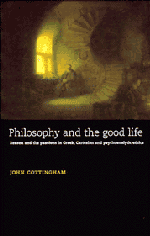4 - Ethics and the challenge to reason
Published online by Cambridge University Press: 04 May 2010
Summary
Nichts ist unwirksamer als intellecktuelle Ideen.
(‘Nothing influences our conduct less than do intellectual ideas.’)
C. G. JungTHE ECLIPSE OF REASON
L'homme se trouve devant l'irrationnel.
(‘Man stands face to face with the irrational.’) Albert Camus
The traditional project of synoptic ethics aims at the discovery of a rational life-plan for human happiness; its achievement is the jewel in the philosopher's crown, the ultimate accolade set on the activity of philosophizing. For the ancient Greek thinkers, what makes us essentially human is above all our rationality, and the models of well-being they offer are shaped by reason in the light of its best perceptions of what will realize our true nature. The resulting blueprint is either one where rational activity itself is viewed as the supreme good, or else one in which reason is seen as the essential coordinator and controller of the fulfilled life. Many centuries later, we find in Descartes a view of ethics as part of a philosophical system whose structure is illuminated by the ‘light of reason’; the end-point of philosophical knowledge is that we should reach a clear understanding both of the world around us and of our own human nature, and, armed with the power that understanding brings, be able to bring about the conditions for a worthwhile life.
From our contemporary standpoint, we cannot approach the optimistic ethics of the classical and early modern eras without being aware of a powerful challenge to the traditional doctrine of reason as the determiner and realizer of the conditions for the good life.
- Type
- Chapter
- Information
- Philosophy and the Good LifeReason and the Passions in Greek, Cartesian and Psychoanalytic Ethics, pp. 104 - 166Publisher: Cambridge University PressPrint publication year: 1998



